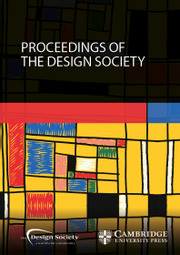Article contents
MODELLING AND PROFILING STUDENT DESIGNERS’ COGNITIVE COMPETENCIES IN COMPUTER-AIDED DESIGN
Published online by Cambridge University Press: 27 July 2021
Abstract
There are three approaches to studying designers – through their cognitive profile, design behaviors, and design artifacts (e.g., quality). However, past work has rarely considered all three data domains together. Here we introduce and describe a framework for a comprehensive approach to engineering design, and discuss how the insights may benefit engineering design research and education. To demonstrate the proposed framework, we conducted an empirical study with a solar energy system design problem. Forty-six engineering students engaged in a week-long computer-aided design challenge that assessed their design behavior and artifacts, and completed a set of psychological tests to measure cognitive competencies. Using a machine learning approach consisting of k-means, hierarchical, and spectral clustering, designers were grouped by similarities on the psychological tests. Significant differences were revealed between designer groups in their sequential design behavior, suggesting that a designer's cognitive profile is related to how they engage in the design process.
- Type
- Article
- Information
- Creative Commons
- This is an Open Access article, distributed under the terms of the Creative Commons Attribution-NonCommercial-NoDerivatives licence (http://creativecommons.org/licenses/by-nc-nd/4.0/), which permits non-commercial re-use, distribution, and reproduction in any medium, provided the original work is unaltered and is properly cited. The written permission of Cambridge University Press must be obtained for commercial re-use or in order to create a derivative work.
- Copyright
- The Author(s), 2021. Published by Cambridge University Press
References
- 1
- Cited by


